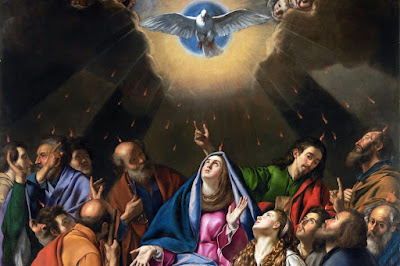On the fiftieth day after Resurrection Sunday, we celebrate the descent of the Holy Spirit upon the disciples. It is reflected in the Third Glorious Mystery of the Holy Rosary, followed by the Ascension of the Lord, which is the Second Glorious Mystery, after the Resurrection, the First Glorious Mystery.
Because it is the 50th day, it is called
Pentecost, which, in Greek, literally means “fiftieth” (πεντηκοστή/pentecoste).
In the Jewish tradition, Pentecost is known as “Shavuot”( שָׁבוּעוֹת)(
Leviticus
23:15-22). This holiday falls on the 50th day from Passover,
counting 49 days in between. It is the festival to offer the first-fruits of
labors in the field (Leviticus 23:16).
What is so significant about the descent of the Holy Spirit
on Pentecost day? What is so significant that the Holy Spirit descending upon
the disciples on the 50th day after the incarnated Christ was raised
from the dead? Does it have anything to do with first-fruits?
It was the day when the disciples received the Holy Spirit
(Acts 2:1-12), as promised by Christ (John 14:16, 26; Acts 1:5, 8).
According to Paul, what resulted in the descent of the Holy Spirit upon the disciples on Pentecost is the birth of one holy catholic apostolic church, as one body of Christ with many functioning parts, fully endowed with the gifts of the Holy Spirit (1 Corinthians 12:1-31). Therefore, the Church is the first-fruit of the resurrection of the Lord, who died not only as the Yom Kippur sacrifice to atone our sins (Leviticus 16:1-19; Hebrews 9:11-28) but also as the Passover sacrificial lamb (Exodus 12:46; John 19:31-34), which John the Baptist called, “The Lamb of God, who takes away the sin of the world”(John 1:29).
As the first-fruit of the resurrection, which signifies
Christ’s conquest of death (Acts 2:24; 1 Corinthians 15:55-57; cf. Mark 12:27),
the Church was born on Pentecost through the Holy Spirit infusing and empowering
the disciples, who gathered as one (Acts 2:1). In fact, Christ is the first-fruit of the dead
and the resurrection (1 Corinthians 15:20-24) to rule with the absolute
sovereignty as the King (1 Corinthians 15:25-28). As the first-fruit of Christ’s
resurrection to have conquered death, the Church is to bring this first-fruits of
the dead and the resurrection, namely, the Christ, to all the ends of the
earth, to show his victory (i.e. Psalm 98:1-3). For this, Christ commissioned
his disciples to make disciples in all nations (Matthew 28:19).
The Holy Spirit descended upon the disciples not only
to become the Church but to be sent out on their respective apostolic missions.
Therefore, Pentecost marks the beginning of the apostolic age, when ecclesiological
and pneumatological concepts are integrated into Christology.
In the Gospel Reading of Pentecost Sunday (John 20:19-23),
we see Jesus offering the disciples the Holy Spirit in his gentle breath, along
with his peace, to send them, as the Father has sent him, for reconciliation
through forgiveness. This reflects an apostolic mission of the Church, being
sent to prompt forgiveness and reconciliation, to heal division and fissions
for unity with one another through faith in Christ, as it is Christ’s desire
(John 17:17-23).
The first-fruit of the resurrection of Christ is one
holy catholic apostolic Church, born of the Holy Spirit on Pentecost, after
counting seven weeks (Shavuot) from the resurrection of the incarnated
Christ. She is sent on apostolic mission to bring peace of Christ and his love
for forgiveness to restore unity. The fact that the disciples began to speak in
various tongues upon receiving the Holy Spirit on Pentecost (Acts 2:5-11)
indicates that the descent of the Holy Spirit upon the disciples on Pentecost
is to reverse the effect of the tower of Babel, which resulted in scattering
people and confusing them with different tongues (Genesis 11:1-9). Being filled
with and driven by the Holy Spirit, the Church shall bring people of all
tongues, races, and ethnicities, together into one body of Christ.

No comments:
Post a Comment